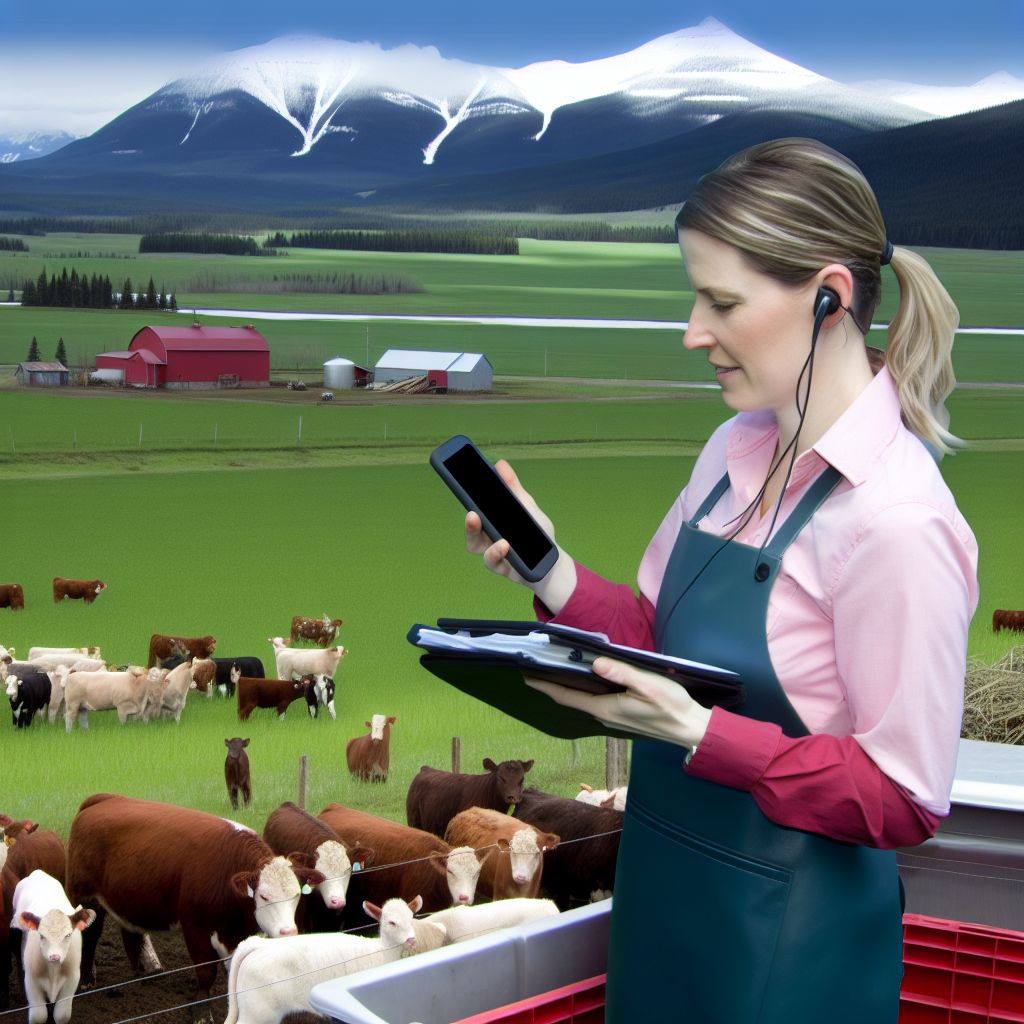Overview of the Role of a Livestock Nutritionist
A livestock nutritionist plays a vital role in animal agriculture.
Their primary responsibility involves formulating balanced diets for livestock.
These diets aim to enhance animal health and overall productivity.
They conduct research on the nutritional needs of different species.
Understanding the biology and physiology of animals is crucial for their work.
Furthermore, they analyze feed ingredients and assess their nutritional value.
This analysis enables the formulation of cost-effective supplements.
Overall, they help producers optimize feed efficiency.
Educational Requirements
Most livestock nutritionists hold at least a bachelor’s degree.
Common fields of study include animal science or nutrition.
Many professionals pursue advanced degrees to deepen their expertise.
Hands-on experience in animal husbandry is also valuable.
Continuing education keeps them updated on industry advancements.
Key Responsibilities
A livestock nutritionist’s responsibilities can be diverse.
They often collaborate with farmers to assess nutritional strategies.
Additionally, they develop feeding programs tailored to specific livestock needs.
Monitoring animal health and performance is another key duty.
This involves adjusting diets based on feedback and observations.
They may also provide training and support for farm staff.
Lastly, they keep detailed records for compliance and optimization.
Work Environment
Livestock nutritionists can work in various settings.
They may be employed by farms, research institutions, or feed companies.
Fieldwork is often required, along with office-based tasks.
This allows for a blend of hands-on and analytical work.
The role frequently requires travel to visit farms and clients.
Unlock Your Career Potential
Visualize a clear path to success with our tailored Career Consulting service. Personalized insights in just 1-3 days.
Get StartedEffective communication skills are essential when collaborating with farmers.
Importance of Job Satisfaction in the Livestock Industry
Enhancing Employee Retention
Job satisfaction significantly impacts employee retention in the livestock sector.
When employees feel satisfied, they are more likely to stay with their organization.
This leads to lower turnover rates.
Consequently, companies save on recruitment and training costs.
Boosting Productivity
High job satisfaction often correlates with increased productivity.
Satisfied employees are generally more engaged in their work.
They tend to put forth extra effort to achieve company goals.
As a result, overall productivity in livestock operations improves.
Improving Workplace Morale
Job satisfaction contributes to better workplace morale.
When employees are happy, they foster a positive work environment.
This positivity influences their colleagues, creating a supportive atmosphere.
Moreover, good morale can lead to enhanced team collaboration.
Ensuring Animal Welfare
Happy employees are more attentive to animal welfare standards.
They take pride in their work and the animals they care for.
As a result, the quality of animal care tends to improve.
This focus on welfare has positive implications for livestock health and productivity.
Promoting Innovation
Job satisfaction encourages creativity and innovation in the workplace.
Employees who feel valued are more likely to share ideas.
This openness leads to advancements in livestock nutrition and care practices.
Ultimately, innovation benefits the entire livestock industry.
Factors Influencing Job Satisfaction Among Livestock Nutritionists
Work Environment
A supportive work environment greatly contributes to job satisfaction.
Livestock nutritionists appreciate workplaces that value collaboration.
Furthermore, a harmonious team fosters productivity and job contentment.
Work settings that promote professional development enhance satisfaction.
Career Advancement Opportunities
The chance for career growth motivates livestock nutritionists.
Clear pathways for promotion lead to higher job satisfaction levels.
Opportunities for ongoing education also play an essential role.
Employers who support skill development attract motivated professionals.
Work-Life Balance
Achieving work-life balance is vital for job satisfaction.
Flexible work schedules help livestock nutritionists manage their personal lives.
When employees can balance work and personal commitments, they thrive.
Employers who recognize this balance retain talented nutritionists.
Compensation and Benefits
Competitive salaries are a major factor in job satisfaction.
Benefits such as health insurance also impact employee happiness.
Livestock nutritionists expect fair compensation for their expertise.
Additionally, retirement plans can enhance long-term job satisfaction.
Job Role and Responsibilities
Clarity in job roles increases job satisfaction.
Livestock nutritionists value well-defined responsibilities.
Moreover, autonomy in decision-making positively influences their satisfaction.
Having the ability to implement their knowledge is crucial.
Recognition and Appreciation
Recognition of hard work significantly boosts job satisfaction.
When employers acknowledge achievements, employees feel valued.
Simple gestures of appreciation motivate livestock nutritionists to excel.
Creating a culture of recognition fosters a positive workplace.
Explore Further: Livestock Nutritionist Role In Maximizing Farm Profits
Work-life Balance Challenges Faced by Livestock Nutritionists
High Demands of the Job
Livestock nutritionists face intense job demands daily.
They often handle multiple clients and projects simultaneously.
Additionally, they maintain strict deadlines for feeding programs.
This pressure can lead to excessive work hours.
Consequently, finding time for personal activities becomes difficult.
Fieldwork Requirements
Much of a livestock nutritionist’s work occurs in the field.
This means traveling to different farms and facilities regularly.
Fieldwork often leads to long and unpredictable hours.
As a result, this can interfere with family time and personal commitments.
Continuous Education and Training
The field of livestock nutrition constantly evolves.
Nutritionists must engage in continuous education and industry training.
This additional commitment requires both time and effort.
Thus, it can add to the already busy schedule of nutritionists.
Client Expectations
Clients have high expectations for livestock nutrition services.
They often demand immediate responses and solutions.
This pressure can create stress for nutritionists.
Consequently, balancing work and personal life becomes a challenge.
Technology and Communication
Advancements in technology require constant connectivity.
Nutritionists are expected to be available beyond office hours.
This expectation can blur the lines between work and home life.
As a result, personal time may suffer due to work obligations.
Delve into the Subject: Soil Science Degrees and Certifications in Canada
Strategies to Enhance Job Satisfaction for Livestock Nutritionists
Fostering Professional Development
Continuous education plays a vital role in job satisfaction.
Participating in workshops and conferences enhances skills.
Networking with professionals boosts career opportunities.
Furthermore, pursuing certifications adds credentials to one’s expertise.
Creating a Supportive Work Environment
A positive workplace culture fosters employee satisfaction.
Supportive management encourages open communication.
Additionally, team-building activities enhance employee relationships.
This collaborative atmosphere increases overall morale.
Implementing Work-Life Balance Initiatives
Employers should promote flexible work schedules.
Remote work options can significantly enhance job satisfaction.
Encouraging time off for mental health is essential.
This ensures employees remain refreshed and productive.
Recognizing and Rewarding Achievements
Acknowledging hard work boosts motivation and commitment.
Implementing reward systems encourages continued excellence.
Regular feedback is crucial for employee development.
Moreover, celebrating milestones creates a sense of accomplishment.
Delve into the Subject: How Livestock Nutritionists Improve Animal Health

Impact of Workplace Environment on Job Satisfaction and Work-Life Balance
Workplace Culture
A positive workplace culture significantly enhances job satisfaction.
It fosters collaboration and communication among employees.
Moreover, a supportive culture encourages professional growth.
Employees feel valued and motivated in a healthy environment.
Physical Environment
The physical workspace directly affects employee well-being.
An organized and clean environment promotes productivity.
Access to natural light and comfortable furniture is essential.
Additionally, break areas allow for relaxation and social interaction.
Flexibility and Autonomy
Providing flexible working arrangements improves work-life balance.
Employees appreciate the option to work remotely when necessary.
Autonomy in decision-making leads to greater job satisfaction.
Moreover, trust from management fosters a positive atmosphere.
Supportive Leadership
Effective leadership plays a crucial role in job satisfaction.
Leaders should prioritize employee feedback and well-being.
Regular check-ins can help address any concerns early.
Supportive leaders promote a sense of belonging and trust.
Professional Development Opportunities
Offering opportunities for growth enhances job satisfaction.
Training programs and workshops empower employees to excel.
Investing in development shows commitment to their futures.
This, in turn, boosts morale and retention rates.
Gain More Insights: Starting a Career in Seed Technology in Canada
Role of Continuous Education and Professional Development on Job Satisfaction
Importance of Continuous Education
Continuous education plays a vital role in enhancing job satisfaction for livestock nutritionists.
It helps professionals stay updated on the latest research and trends.
Additionally, ongoing training boosts confidence in their expertise.
In fact, many nutritionists report feeling more fulfilled when they engage in learning opportunities.
Enhancement of Skills and Knowledge
Professional development enhances technical skills significantly.
Nutritionists gain a deeper understanding of animal dietary needs through specialized courses.
This knowledge translates into better recommendations for clients.
Moreover, advanced skills often lead to career advancement opportunities.
Networking Opportunities
Continuous education also provides networking opportunities with peers.
These connections can lead to collaborations and mentorships.
Such relationships enhance job satisfaction by creating a supportive professional community.
Furthermore, networking can provide access to job openings and projects.
Staying Relevant in a Changing Industry
The livestock industry is evolving rapidly due to technology and research advancements.
Continuous education allows nutritionists to adapt to these changes promptly.
This adaptability is critical for maintaining job market relevance.
As a result, professionals feel more secure in their roles and responsibilities.
Continuous Education Leads to Satisfaction
Continuous education significantly impacts job satisfaction for livestock nutritionists.
It empowers them with the skills and knowledge needed to excel.
The support from networking and adaptability ensures a thriving career.
Ultimately, investing in professional development leads to a more satisfying work-life balance.
Future Trends in Livestock Nutrition That May Affect Job Satisfaction
Shift Towards Sustainable Practices
The livestock industry increasingly emphasizes sustainable practices.
Nutritionists are now adapting their strategies for environmental conservation.
This shift can enhance job satisfaction among professionals who value sustainability.
Furthermore, it fosters a sense of purpose in their work.
Integration of Technology
Technology continues to transform livestock nutrition.
Data analytics tools improve decision-making processes for nutritionists.
Furthermore, precision nutrition approaches are gaining traction.
These advancements can lead to higher job satisfaction through efficiency.
Focus on Animal Welfare
Animal welfare is becoming a priority in livestock nutrition.
Nutritionists are developing diets that enhance animal health.
As a result, this focus contributes to job fulfillment.
Professionals find satisfaction in promoting animal welfare through their expertise.
Collaboration and Interdisciplinary Work
The future of livestock nutrition emphasizes collaboration between disciplines.
Nutritionists are increasingly working with veterinarians and geneticists.
This interdisciplinary approach enriches the work experience.
It fosters a supportive network, enhancing overall job satisfaction.
Regulatory Changes and Compliance
Regulatory frameworks regarding livestock nutrition are evolving.
Nutritionists need to stay informed about new compliance requirements.
Being proactive in adapting to these changes can increase job satisfaction.
Moreover, compliance ensures better outcomes for the livestock industry.
Additional Resources
Grace Gaynor – Group Fitness Instructor – Blacksburg Health and …
2023–2024 Our Purpose & Impact Report McDonald’s Corporation




